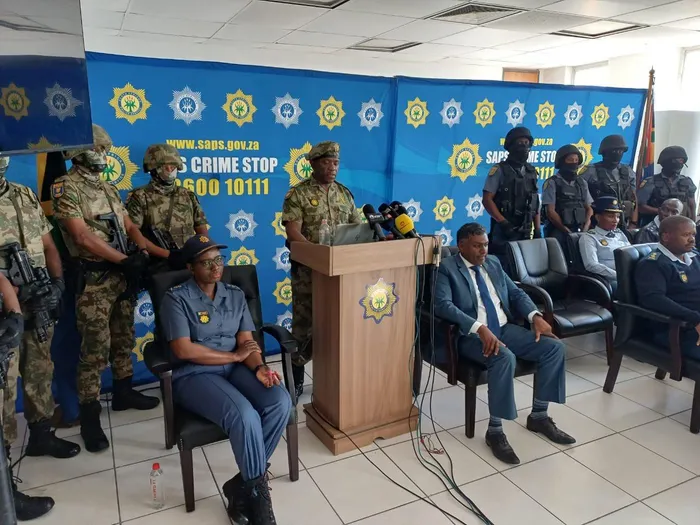Mkhwanazi Versus Mchunu: The Controversial Role of the Political Killings Task Team in KZN

KZN Police Commissioner Lieutenant General Nhlanhla Mkhwanazi addressing a media briefing on Sunday at the SAPS KZN Headquarters. A large body of research material confirms that the Political Killings Task Team makes malicious arrests, covering for politically connected hitmen and tenderpreneurs, says the writer.
Image: SAPS
Mary De Haas
On June 29, in breach of SAPS protocol, KZN Provincial Commissioner Lt-General Nhlanhla Mkhwanazi held an explosive media briefing, riddled with misinformation about the Political Killings Task Team (PKTT) activities, linking the order from Police Minister Mchunu to disband it to his alleged corrupt relationship with a Gauteng-based criminal syndicate. While there is support for an independent inquiry into his allegations about ministerial corruption, the tissue of lies about the PKTT must be exposed.
The establishment of this team followed the Moerane Commission findings into political killings in KZN, its mandate being to investigate such killings. While initially headed by an experienced detective, he retired and was replaced by Brigadier Dumisani Khumalo, who lacked any investigative experience, having, like Generals Mkhwanazi and Masemola, spent his career in Operational Response services. The close relationship of these three generals is the background to the recent media show. Khumalo, lacking Intelligence training, was also appointed to head Crime Intelligence in 2022, when allegations of funds for informers disappearing into the PKTT pockets started. It was then Minister Cele who gave instructions to Khumalo and Mkhwanazi.
Most PKTT activities have evaded public scrutiny. The statistics cited recently, like those of earlier reports, lack the breakdowns needed for fact checking (but it is known that one figure citing sentencing in a specific case was inaccurate) Evaluated against a database of dozens of politically-linked killings in KZN since 2016, the team has achieved virtually nothing it was mandated to do, while costing taxpayers a small fortune.
Mkhwanazi disparages the provincial team, but their achievements far outstrip those of the PKTT. Arrests made by the KZN detectives include three high-profile cases: those of the murders, those of Musawenkosi ‘Maqatha’ Mchunu, Newcastle ANCYL leader Wandile Ngubeni and ANC councillor Sindiso Magaqa. The PKTT withdrew charges against the high-profile accused (prominent ANC officials), one of whom subsequently died, as did a key witness. The Mchunu and Ngubeni cases disappeared, and the Magaqa case has dragged on for six years, with the hitman who pulled the trigger being deliberately denied his wish to make a confession by the prosecutor working with the task team. He finally placed it on the court record recently, confirming that those against whom charges had been withdrawn by the PKTT had ordered the killing.
A large body of research material confirms that this team makes malicious arrests, covering for politically connected hitmen and tenderpreneurs. A police officer who provided evidence about who killed South Coast Speaker, Wandile Mkhize, was himself arrested and held without bail for five years until the court found, two months ago, that there was no evidence whatsoever. The Mkhize murder was not investigated. Two Umkomaas police members who arrested hitmen armed with AK47s were maliciously charged, and remain in prison without bail (the evidence used to deny bail has been shown to be lies). The team works with prosecutors who collude with them in fabricating evidence, and routinely ensures that hearings in cases lacking credible evidence are deliberately drawn out.
The team itself comprises a motley bunch of members, not all of whom are detectives, and most from outside KZN. Their travel and luxurious accommodation costs are exorbitant, they are rapidly promoted, and they earn extra deployment monies. Also benefiting are members of the National Intervention Unit who, instead of dealing with armed syndicates, including those invading land under interdiction in Camperdown, and construction mafias, accompany these detectives everywhere - an unheard-of practice.
These team members behave like the apartheid police. They routinely break laws with impunity, seizing phones and searching homes without orders and warrants, and use physical and mental torture to extract information from potential witnesses and accused people, to coerce them into signing fabricated statements.
In referring to the Gauteng syndicate case, Mkhwanazi shows that the team is operating outside of its mandate. Such investigations, and municipal corruption (as in cases they opened in Nongoma), are the mandate of the DPCl. He refers to the Fort Hare murders, ignoring the fact that two forensic lawyers investigating corruption there were confronted by task team/NIU members armed with rifles, some wearing balaclavas, who seized legally privileged documents and maliciously charged them. If Mkhwanazi feels so strongly about syndicates, why is he ignoring the convicted drug dealer and human trafficker in his own upmarket northern Durban suburb?
Mkhwanazi has, contrary to SAPS protocol, been using the media to build his image as a crime-fighting cop, winning public support. However, his recent media bombshell has sinister overtones. He should face disciplinary charges, but there are now threats on social media that, should he be touched in any way, there may be July 2021-type protests. Mkhwanazi himself could not even be reached telephonically during that mayhem, and those behind it have never been identified and charged, raising serious questions about exactly who stands to gain from his recent public relations stunt.
* Mary de Haas is a violence monitor in KZN, a honorary Research Fellow at the University of KZN’s School of Law and a member of the Navi Pillay Research Group on justice and human rights.
** The views in this article do not necessarily represent the views of IOL, Independent Media or The African.